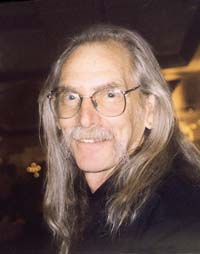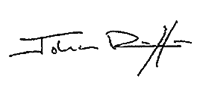 |
||||
|
|
|
|||
|
|
|
|||

"Stevie Wonder" T's motor was running at off-idle as he sidled into my office at Car Craft Magazine one day in the spring of 1970, burbling, gurgling noises emanating from under his breath. Terry Cook is a big guy, and he carried his college wrestler physique well, barrel chest thrust forward, particularly when he wanted to make a point. This was the area from which he could boom commands when he arrived at a point at which he felt stentorian volume was called for. His staff knew well the power of that resonance, and if they weren't cowed by it, it at least got their attention. But on this day, the sound was definitely at off-idle, a 429 Ford "Shotgun" motor (Cook had so nicknamed FoMoCo's specially prepared drag racing engine in the fall of 1968, and it stuck throughout its existence) running at maybe 1200 rpm, indicating that Cook was mulling over something new in the part of his brain that was dedicated to the magazine and the performance car world in general. You had to know T to detect and interpret the sounds he made at that time, but I think I had pretty much figured them out during the three years we had partnered in developing Car Craft as Petersen Publishing's entry in the drag race periodicals world. That universe was big at the time and expanding almost by the month, as first Detroit and finally the rest of the motoring world came to realize what was really happening on the 1320-foot slabs that thousands of here-to-there-as-quick-as-you-can racers called home. When Cook's purling paused for a moment, I inquired with the '70s equivalent of "wassup?" (which was probably … "wassup?"). Laying a sheaf of papers on my desk, he replied, "Think maybe we ought to hire this guy," spoken with the economy of words he used when he was really under a deadline gun and needed a quick response. Shortly before, Terry and I had decided that we needed another staffer, and management had agreed without a "why?" or a whimper. (One of the wonderful rewards for being involved with Car Craft at the time was that in the eyes of the "suits" we could hardly do anything wrong. We had almost doubled the circulation in under three years, and there was a positive aura in our offices that fairly hummed as a result of the output from the typewriters, cameras, and art implements wielded expertly by Don Green, Fred Gregory, Ro McGonegal, Jere Alhadeff, Carol DeMarinis, and Albert Esparza, with support from Chris Carlton and Susan Foster, and contributions from A.B. Shuman, Jim McFarland and Don Prieto, with Cook and I acting as directors). "Who is he and what's his background?" I asked. "Name's Steve Collison, and you're really gonna have to trust me on this one." "What's wrong? What magazine is he working for now?" Cook began burbling again. I detected "… phone company …" in as soft a tone as I'd ever heard from him, and little else. "He writes stuff for the phone company?" "Not exactly … in fact, I think he installs phones," spoken even more quietly. "So he writes car stuff on the side? Can he take pictures …?" "He's never written any car stuff and I don't think he takes pictures." Pause. "Okay, T, what's the joke?" Up till then, Cook had always carefully considered all of the skills and potential of the people we hired, so I was a bit nonplused if this was the best he could come up with in answer to the ad we had placed in the Los Angeles Times. "Look, I'm on deadline and I've gotta ride herd on three stories that were just turned in, so all I'm saying is that you ought to talk to this guy. If he doesn't cut it, we haven't lost anything except a little time, okay?" he implored as he backed toward the door. "He's in my office. Can I send him in?" "Okay, okay," I surrendered. A minute later, I got my first impression of Steve Collison: Deer-In-The-Headlights tentative, but with traces of a Kid-In-A-Candy-Shop smile. "Steve Collison, Mr. Raffa," he finally offered, extending a hand in my direction that was firm and dry when I clasped it. After some preliminary bantering, I asked, "What's your automotive background, and why do you think you'd fit in here? Terry Cook tells me you've never had anything about cars …" The next word out of my mouth was supposed to be "published," but it never got off my tongue. For the next 15 minutes or so, in perhaps the greatest show of enthusiasm I had ever experienced in an interview milieu, Collison rattled my roof with the knowledge he had about the current drag scene, his own car building experience, and his racing dreams. I did manage to ascertain that he had been brought up in an environment that allowed him to learn proper grammar and gain an appreciation of academics, even though he never got a college diploma. His close friend for 22 years, photographer Francis Butler, informed me that that latter fact seemed to bother Collison a lot throughout his professional life, though there's no proof that it ever became of any importance to those who had the privilege of working with him, nor did it impair his ability to turn a phrase that was so often "right there." Even though my "interview" with Collison continued to become more of a soliloquy, I was finally able to ask him some questions about his personal life, in keeping with the knowledge of how close a staff must work together to make sure there was something printed on every page of our monthly before it was rushed to the airport, sometimes by Cook personally. In the end, I found Steve's personal habits to be in concert with those of most of the rest of the staff, given our time-place in history, and I, like Cook, thought there was no way he wouldn't succeed. A little later, even though Terry and I patted each other on the back for our "good call" as Steve's latent talent began to reveal itself, it was really one of the easiest calls in history. How often in an executive's lifetime does he or she get a chance to hire passion! Collison, of course, went on to become an All-Star in the annals of drag racing journalism, and those exploits have been well chronicled elsewhere. On a personal note, in May of 1995, in the pages of Super Stock Magazine, home to us both at different times, Steve wrote the most complimentary column anyone has ever written about me. I'm sure there are many others who would make the same claim. I was shocked at receiving the news of his death a week ago, but I must say I've become inured to some degree to the occasions when these tragedies occur in our family, as too many of us really get to believe that we're superhuman and fail to take as much care with our health as we do in trying to create the definitive photograph or the perfect written word. If Stevie didn't accomplish the latter, he came so damn close it doesn't matter, but was the cost of doing so too high? Maybe there was nothing that could have warned Steve about the fatal attack he suffered. I truly hope that is the case. For the rest of us, may his passing serve as a sign. His wife, Cathy, and Kevin, Sammy and Elizabeth, his three fantastic teenage kids, are left with more sadness than all the rest of us combined, and that must be a nearly unbearable load to suffer, as I am still at a stage where I can't actually believe I won't ever see that wonderful, guileless, passionate smile again, and that hurts bad enough. Rest easy, my brother. You are missed. Write to John Raffa directly at dcdragons@aol.com
photo by Karen Raffa |
 |
|||
|
Copyright 2000, Drag Racing Online and Racing Net Source |
||||



